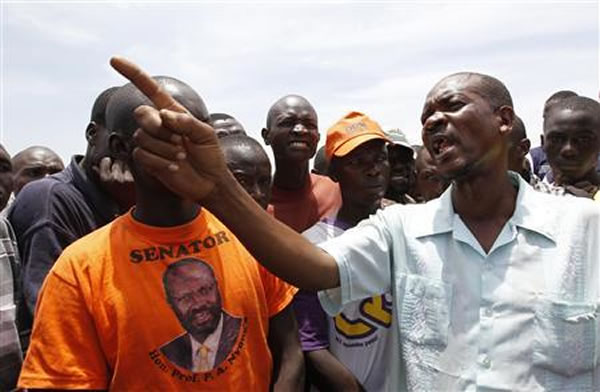
People discuss the presidential elections results in the western town of Kisumu, 350km (218 miles) from the capital Nairobi, March 7, 2013. The running mate of Kenya's presidential candidate Raila More...
Credit: REUTERS/Thomas Mukoya

By Edmund Blair and Richard Lough
Thursday, March 07, 2013
Odinga, Kenya's prime minister, is trailing Uhuru Kenyatta in the partial count. His running mate Kalonzo Musyoka, who made the comments, said they were not a call for mass action and urged voters to stay calm and patient.
Kenyatta has been indicted for crimes against humanity over ethnic violence which grew out of disputes over Kenya's last election in 2007 that killed 1,200 people, posing a dilemma for Western governments if he wins.
Despite technical glitches, international observers have in past days broadly said the vote and count was transparent, but Musyoka said it should be stopped.
"We as a coalition take the position the national vote tallying process lacks integrity and has to be stopped and re-started using primary documents from the polling stations," he told a news conference.
"We have evidence the results we are receiving have been doctored," he said.
Election officials said the count would not stop and the results could be delivered by Friday. The commission has up to seven days from Monday's vote to declare the outcome.
Issack Hassan, chairman of the Independent Electoral and Boundaries Commission, dismissed charges of any manipulation, saying: "The commission wishes to assure Kenyans that with the rigorous verification process in place, there is no room to doctor the results whatsoever by any election official."
"We cannot stop tallying, this is a legal process..."
Kenyans have been hoping this vote will restore its image as one of Africa's more stable democracies after the mayhem five years ago and many have voiced determination not to take their differences to the streets but to turn to a reformed judiciary.
Witnesses said areas in the capital Nairobi and Kisumu, a city in the west of Kenya, where violence erupted after the 2007 vote, appeared calm shortly after Musyoka's comments.
COUNT DRAGS ON
"It is not a call to mass action," Musyoka said. "We must tell them (Kenyans) there will be no mass action. We are committed as a coalition to the principle of the rule of law."
By 10.15 a.m. ET, with about 6 million votes tallied, Kenyatta had about 3.1 million votes to Odinga's 2.6 million, giving the deputy prime minister more than 50 percent.
But there is still some way to go, as turnout was estimated at more than 70 percent of the 14.3 million voters.
Kenyatta's coalition has also complained, about the use of rejected ballots in the vote count, without calling for a halt. Both teams have also urged voters to be patient.
Kenyatta and his running mate, William Ruto, are charged by the International Criminal Court in The Hague for orchestrating the tribal blood-letting after the 2007 vote. They both deny the charges but said they would cooperate to clear their names.
Judges at the ICC agreed on Thursday to delay the start of Kenyatta's trial for crimes against humanity to July 9 from April 11, to give defense lawyers more time to prepare.
Musyoka questioned the sharp fall in the number of spoiled ballots counted as Kenya scrapped an electronic tallying system and switched to rely solely on a manual one. The amount of those ballots could have a significant impact on the outcome.
The election commission chairman Hassan said the original high figure was due to a computer error.
If no candidate gets more than 50 percent of votes in the first round, the top two will go to a run-off, provisionally set for April depending on any legal challenges.
The electronic system that broke down had aimed to provide speedy provisional results before the final figures were manually gathered. The vacuum left when that system failed has been filled by complaints by rivals over the process.
"LET'S MAINTAIN THAT PEACE"
Voting passed off broadly peacefully, and Kenyans have said they are determined to see it stay that way. But many businesses had stayed closed or kept stocks low as a precaution against the kind of violence and looting that erupted last time.
The government on Thursday ordered all civil servants to report to work on Friday, after four days in which many of them had stayed away from their offices.
In Nairobi's Mathare slum, a flashpoint in the violence five years ago, residents played down any talk of bloodshed.
"I don't anticipate any violence. We are all Kenyans and there is no need to fight. We voted peacefully, let's maintain that peace," said Shadrack Otieno, a 37-year-old Odinga backer.
In Kisumu, the biggest city in Odinga's tribal heartland, businesses, which had shut for voting, started re-opening for the first time in four days.
"If this trend continues then we will protest in the streets," minibus taxi conductor Joseph Omwaru told Reuters, adding he believed there was rigging in Kenyatta's favor.
The Kenyan shilling has been volatile against the U.S. dollar with each twist and turn of election, climbing when a clear result looked like it could emerge swiftly but weakening with the uncertainty of the slow count.
(Additional reporting by Duncan Miriri and Yara Bayoumy in Nairobi, Drazen Jorgic in Mombasa and Hezron Ochiel in Kisumu; writing by Edmund Blair and James Macharia; editing by Janet McBride, Peter Millership and Philippa Fletcher)
Source: Reuters